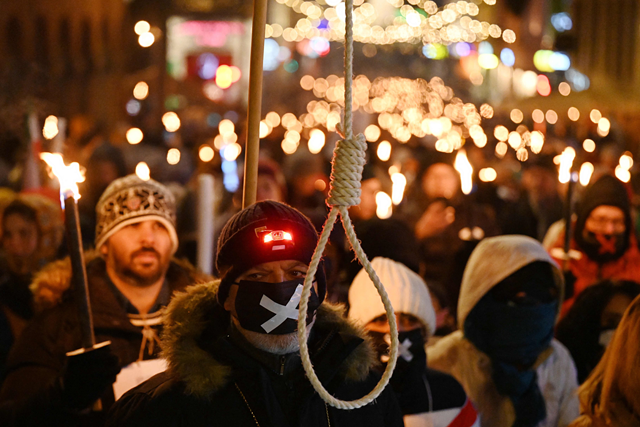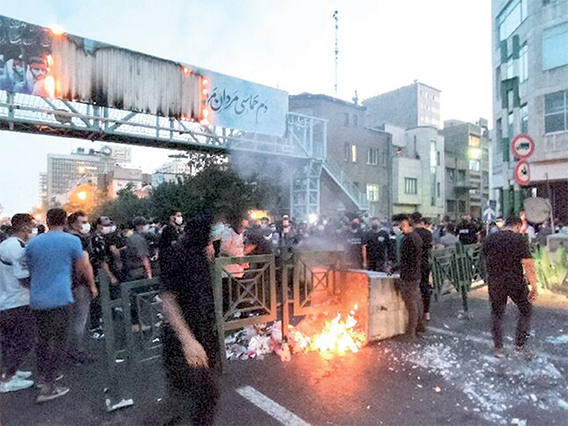You are here
Iran defies outcry with second protest execution
By AFP - Dec 13,2022 - Last updated at Dec 13,2022

A participant with a gallows, who covers his face with a mask with a cross, along with other members of the Iranian diaspora marches during a torchlight procession to greet the 2022 Nobel Prize laureates in Oslo, on Saturday (AFP photo)
PARIS — Iran on Monday executed a second man in connection with protests that have shaken the regime for months, defying an international outcry over its use of capital punishment against those involved in the movement.
Majidreza Rahnavard, 23, had been sentenced to death by a court in the city of Mashhad for killing two members of the security forces with a knife, and wounding four other people, the judiciary’s Mizan Online news agency reported.
It said he was hanged in public in the city, rather than inside prison.
He was executed just over three weeks after he was arrested in November, rights groups said.
The hanging also came only four days after Mohsen Shekari, also 23, was executed on Thursday on charges of wounding a member of the security forces in the first case of the death penalty being used against a protester.
The executions drew a sharp rebuke from Iran’s arch-foe the United States, with State Department spokesman Ned Price saying they “underscore how much the Iranian leadership actually fears its own people”.
Iran calls the protests “riots” and says they have been encouraged by its foreign foes.
Mizan published images of Rahnavard’s execution, showing a man with his hands tied behind his back hanging from a rope attached to a crane. The execution took place before dawn and there was no sign that a significant number of people witnessed it.
The director of Oslo-based group Iran Human Rights (IHR), Mahmood Amiry-Moghaddam, said Rahnavard “was sentenced to death based on coerced confessions after a... show trial”.
“The public execution of a young protester, 23 days after his arrest, is another serious crime committed by the Islamic republic’s leaders,” he told AFP.
New EU sanctions
The protests were sparked by the September 16 death in custody of Mahsa Amini, 22, a Kurdish-Iranian arrested by the morality police for allegedly breaching the Islamic republic’s strict dress code for women.
The protests represent the biggest challenge to the regime since the shah’s ouster in 1979 and have been met with a crackdown that activists say aims to instil public fear.
EU ministers meeting in Brussels on Monday stepped up sanctions on Iran over the crackdown.
The targets of the new EU sanctions included state broadcaster IRIB, its director and a TV news anchor for airing forced confessions of detainees.
Army commander-in-chief Abdolrahim Mousavi, the deputy interior minister, and regional commanders of the Revolutionary Guard Corps were also hit with asset freezes and visa bans.
Iran sought to preempt the EU move by imposing sanctions of its own against the heads of the UK’s domestic spy agency and military, along with British and German political figures.
US-based dissident Masih Alinejad charged that “Majidreza Rahnavard’s crime was protesting the murder of Mahsa Amini”.
“The regime’s method of dealing with protests is execution,” said Alinejad, adding: “EU, recall your ambassadors.”
The office of the UN rights commissioner said it was “appalled” by the news of Rahnavard’s execution.
Reports ahead of the execution had described Rahnavard as a young fitness fanatic and a successful amateur wrestler.
Rights groups including IHR have said images have shown he was beaten in custody and forced into a purported confession broadcast on state media.
The protest monitor social media channel 1500tasvir said his family had been informed of the execution only after it was carried out.
It published pictures of a last meeting between the condemned man and his mother, saying she had left with no idea he was about to die.
A spokesman for UN Secretary General Antonio Guterres said he viewed the circumstances surrounding this latest execution as “particularly cruel”, and that he, along with the UN Human Rights Office, would seek to prevent any further executions.
‘Risk of mass execution’
Iran’s use of the death penalty is part of a crackdown that IHR says has seen the security forces kill at least 458 people.
According to the UN, at least 14,000 have been arrested.
Iran is already the world’s most prolific user of the death penalty after China, Amnesty International says.
Public executions are however highly unusual in the Islamic republic, and one in July was described by IHR as the first in two years.
Prior to the two executions, Iran’s judiciary said it had issued death sentences to 11 people in connection with the protests, but campaigners say around a dozen others face charges that could see them also receive the death penalty.
Amnesty on Saturday warned that the lives of two more young men sentenced to death — Mahan Sadrat and Sahand Nourmohammadzadeh — were at imminent risk.
Amiry-Moghaddam warned of “a serious risk of mass execution of protesters” and urged a strong international “response that deters the Islamic republic leaders from more executions”.
Related Articles
PARIS — Iran on Saturday executed two men for killing a paramilitary force member during unprecedented protests sparked by the death in cust
PARIS — A doctor, rap artists and a footballer are among around two dozen Iranians who risk being hanged as Tehran uses capital punishment a
TEHRAN — A young Iranian who had been sentenced to death for his actions during protests over the death of Mahsa Amini has been given a stay












